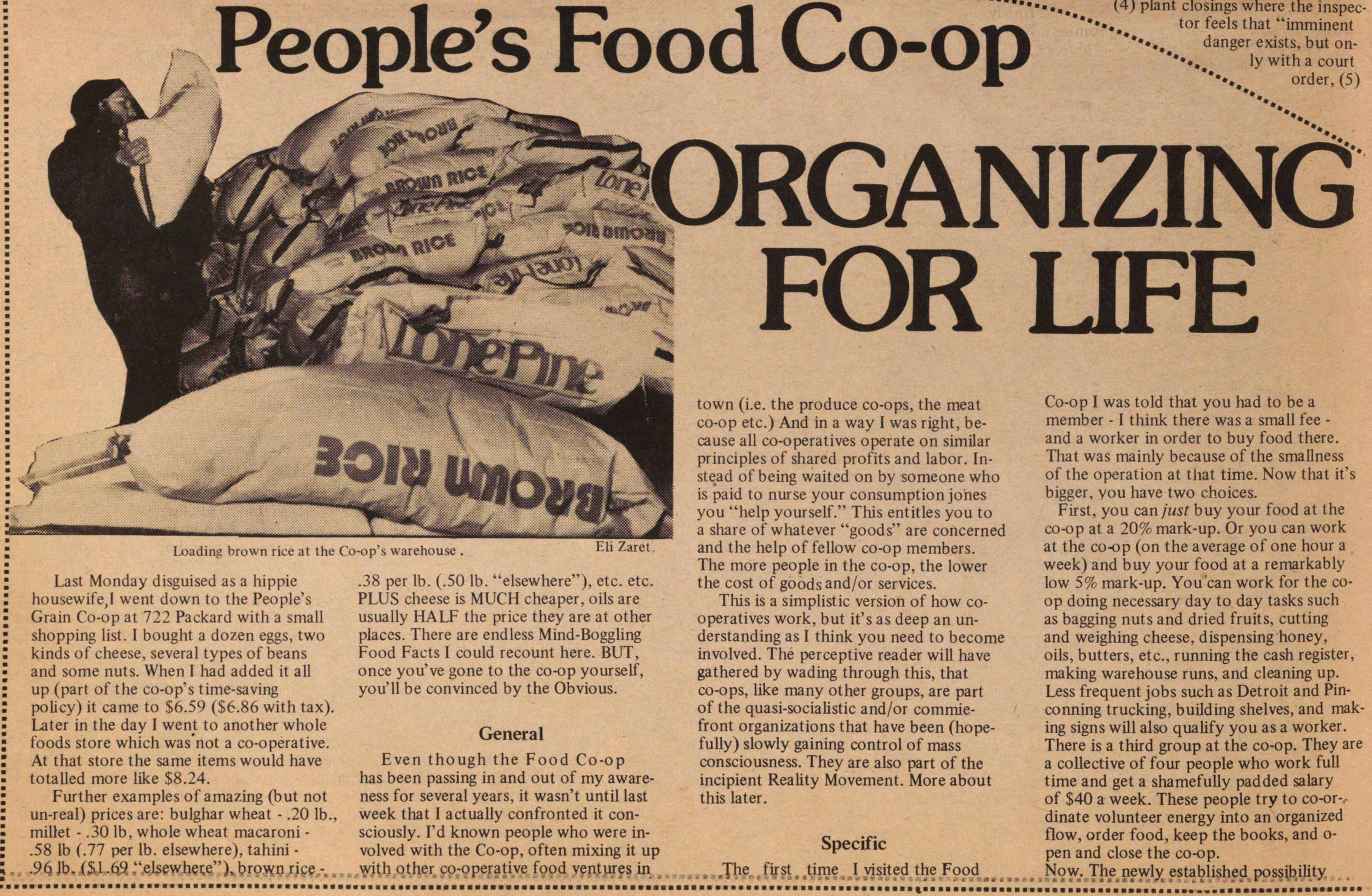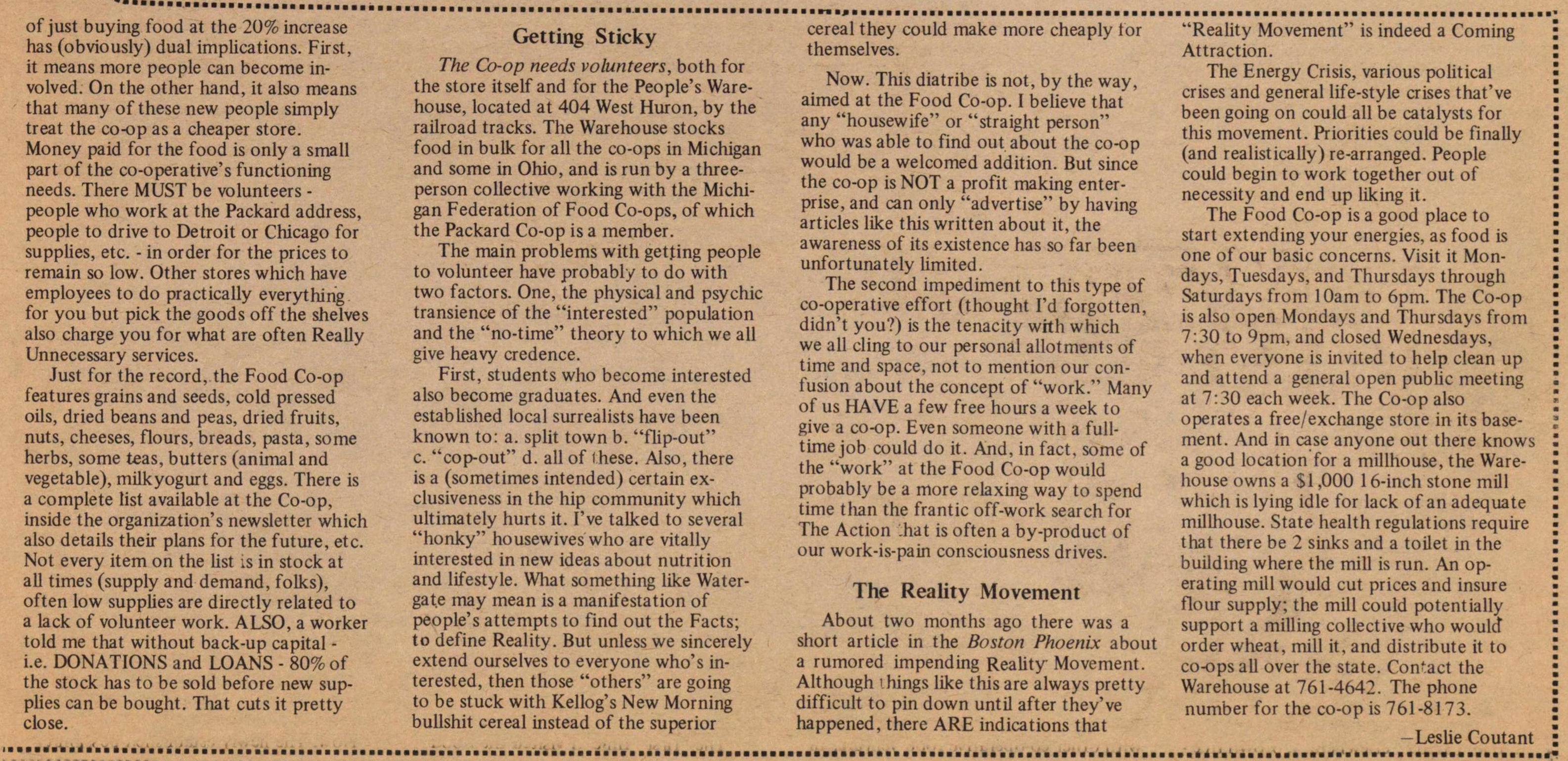People's Food Co-op - Organizing for Life


Last Monday disguised as a hippie housewife, I went down to the People’s Grain Co-op at 722 Packard with a small shopping list. I bought a dozen eggs, two kinds of cheese, several types of beans and some nuts. When I had added it all up (part of the co-op’s time-saving policy) it came to $6.59 ($6.86 with tax). Later in the day I went to another whole foods store which was not a co-operative. At that store the same items would have totaled more like $8.24.
Further examples of amazing (but not un-real) prices are: bulghar wheat - .20 lb., millet - .30 lb., whole wheat macaroni - .58 lb. (.77 per lb. elsewhere), tahini - .96 lb. ($1.69 “elsewhere”), brown rice. - .38 per lb. (.50 lb. “elsewhere”), etc. etc. PLUS cheese is MUCH cheaper, oils are usually HALF the price they are at other places. There are endless Mind-Boggling Food Facts I could recount here. BUT, once you’ve gone to the co-op yourself, you’ll be convinced by the Obvious.
General
Even though the Food Co-op has been passing in and out of my awareness for several years, it wasn’t until last week that I actually confronted it consciously. I’d known people who were involved with the Co-op, often mixing it up with other co-operative food ventures in town (i.e. the produce co-ops, the meat co-op etc.) And in a way I was right, because all co-operatives operate on similar principles of shared profits and labor. Instead of being waited on by someone who is paid to nurse your consumption jones you “help yourself.” This entitles you to a share of whatever “goods” are concerned and the help of fellow co-op members. The more people in the co-op, the lower the cost of goods and/or services.
This is a simplistic version of how cooperatives work, but it’s as deep an understanding as I think you need to become involved. The perceptive reader will have gathered by wading through this, that co-ops, like many other groups, are part of the quasi-socialistic and/or commie-front organizations that have been (hopefully) slowly gaining control of mass consciousness. They are also part of the incipient Reality Movement. More about this later.
Specific
The first time I visited the Food Co-op I was told that you had to be a member - I think there was a small fee - and a worker in order to buy food there. That was mainly because of the smallness of the operation at that time. Now that it’s bigger, you have two choices.
First, you can just buy your food at the co-op at a 20% mark-up. Or you can work at the co-op (on the average of one hour a week) and buy your food at a remarkably low 5% mark-up. You can work for the coop doing necessary day to day tasks such as bagging nuts and dried fruits, cutting and weighing cheese, dispensing honey, oils, butters, etc., running the cash register, making warehouse runs, and cleaning up. Less frequent jobs such as Detroit and Pinconning trucking, building shelves, and making signs will also qualify you as a worker. There is a third group at the co-op. They are a collective of four people who work full time and get a shamefully padded salary of $40 a week. These people try to co-ordinate volunteer energy into an organized flow, order food, keep the books, and open and close the co-op.
Now. The newly established possibility of just buying food at the 20% increase has (obviously) dual implications. First, it means more people can become involved. On the other hand, it also means that many of these new people simply treat the co-op as a cheaper store. Money paid for the food is only a small part of the co-operative’s functioning needs. There MUST be volunteers – people who work at the Packard address, people to drive to Detroit or Chicago for supplies, etc. – In order for the prices to remain so low. Other stores which have employees to do practically everything for you but pick the goods off the shelves also charge you for what are often Really Unnecessary services.
Just for the record, the Food Co-op features grains and seeds, cold pressed oils, dried beans and peas, dried fruits, nuts, cheeses, flours, breads, pasta, some herbs, some teas, butters (animal and vegetable), milk yogurt and eggs. There is a complete list available at the Co-op, inside the organization’s newsletter which also details their plans for the future, etc. Not every item on the list is in stock at all times (supply and demand, folks), often low supplies are directly related to a lack of volunteer work. ALSO, a worker told me that without back-up capital – i.e. DONATIONS and LOANS – 80% of the stock has to be sold before new supplies can be bought. That cuts it pretty close.
Getting Sticky
The Co-op needs volunteers, both for the store itself and for the People’s Warehouse, located at 404 West Huron, by the railroad tracks. The Warehouse stocks food in bulk for all the co-ops in Michigan and some in Ohio, and is run by a three-person collective working with the Michigan Federation of Food Co-ops, of which the Packard Co-op is a member.
The main problems with getting people to volunteer have probably to do with two factors. One, the physical and psychic transience of the “interested” population and the “no-time” theory to which we all give heavy credence.
First, students who become interested also become graduates. And even the established local surrealists have been known to: a. split town b. “flip-out” c. “cop-out” d. all of these. Also, there is a (sometimes intended) certain exclusiveness in the hip community which ultimately hurts it. I’ve talked to several “honky” housewives who are vitally interested in new ideas about nutrition and lifestyle. What something like Watergate may mean is a manifestation of people’s attempts to find out the Facts; to define Reality. But unless we sincerely extend ourselves to everyone who’s interested, then those “others” are going to be stuck with Kellog’s New Morning bullshit cereal instead of the superior cereal they could make more cheaply tor themselves.
Now. This diatribe is not, by the way, aimed at the Food Co-op. I believe that any “housewife” or “straight person” who was able to find out about the co-op would be a welcomed addition. But since the co-op is NOT a profit-making enterprise, and can only “advertise” by having articles like this written about it, the awareness of its existence has so far been unfortunately limited.
The second impediment to this type of co-operative effort (thought I’d forgotten, didn’t you?) is the tenacity with which we all cling to our personal allotments of time and space, not to mention our confusion about the concept of “work.” Many of us HAVE a few free hours a week to give a co-op. Even someone with a fulltime job could do it. And, in fact, some of the “work” at the Food Co-op would probably be a more relaxing way to spend time than the frantic off-work search for The Action that is often a by-product of our work-is-pain consciousness drives.
The Reality Movement
About two months ago there was a short article in the Boston Phoenix about a rumored impending Reality Movement. Although things like this are always pretty difficult to pin down until after they’ve happened, there ARE indications that “Reality Movement” is indeed a Coming Attraction.
The Energy Crisis, various political crises and general life-style crises that’ve been going on could all be catalysts for this movement. Priorities could be finally (and realistically) re-arranged. People could begin to work together out of necessity and end up liking it.
The Food Co-op is a good place to start extending your energies, as food is one of our basic concerns. Visit it Mondays, Tuesdays, and Thursdays through Saturdays from 10 am to 6 pm. The Co-op is also open Mondays and Thursdays from 7:30 to 9 pm, and closed Wednesdays, when everyone is invited to help clean up and attend a general open public meeting at 7:30 each week. The Co-op also operates a free/exchange store in its basement. And in case anyone out there knows a good location for a millhouse, the Warehouse owns a $1,000 16-inch stone mill which is lying idle for lack of an adequate millhouse. State health regulations require that there be 2 sinks and a toilet in the building where the mill is run. An operating mill would cut prices and ensure flour supply; the mill could potentially support a milling collective who would order wheat, mill it, and distribute it to co-ops all over the state. Contact the Warehouse at 761-4642. The phone number for the co-op is 761-8173.
-Leslie Coutant
Article
Subjects
Freeing John Sinclair
Old News
Ann Arbor Sun